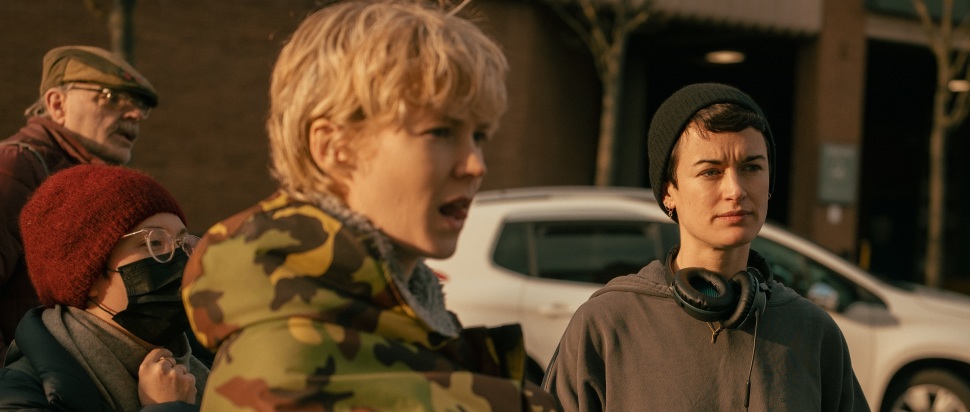Georgia Oakley on Section 28 drama Blue Jean
Georgia Oakley's debut feature takes us back to the dark days of Margaret Thatcher's Britain and the introduction of Section 28. Oakley talks about researching this era and finding moments of hope in this bitter period for LGBTQ+ people in the UK
“Not everything is political,” says Jean, the protagonist of Georgia Oakley's Blue Jean. She’s half-heartedly protesting to Viv’s objection to a cheesy dating show. Their instant noodles sit forgotten, the fuzzy television screen now black. “Of course it is,” Viv replies, toying with Jean’s hair, before they pull each other in for a kiss, all smiles and heady breathing.
In Blue Jean’s 1980s north-east England, the girls’ changing room is a site of social tension, queer women smoke inside their dimly lit local, and RP voices on the radio announce the oncoming Section 28. Under Thatcher’s rule, the law prohibited schools and councils from ‘promoting’ homosexuality. This is of particular threat to Jean (Rosy McEwen), a gay PE teacher aiming to keep her personal life out of her professional life – and vice versa. The arrival of new pupil Lois (Lucy Halliday) sees Jean at risk of exposure. Her anxiety spills into her work and relationships, with this mental toll depicted with both care and precision. The resulting film is a mindful and quietly forceful exploration of systemic oppression, and it's earned both Georgia Oakley, the writer and director, and Hélène Sifre, the producer, BAFTA nominations for Outstanding Debut. Resisting simple storylines or characters, it depicts the multitudes of the queer experience – in, of course, multiple shades of blue.
For Oakley, the cool colour palette “was an instinctive thing." The somehow sharp yet soft azure of Jean and Lois’s eyes, the cobalt cones across a netball court, the slightly greying coast – there’s something so natural to it. It begins gently, with each blue touch tugging us in, scene by scene, before consuming the screen as Jean’s inner turmoil culminates.
But it evidently colours the title also. “In the early phases of research, we found a breakdown of lesbian terminology from the 80s,” explains Oakley. “You could be butch or femme but you could also be a blue jean femme. It was a strand of femme lesbian that meant that you would rather wear blue jeans than typically feminine clothing but that you presented as femme.”
This thorough research persisted. Two PE teachers were advisers on set, sharing their experiences as gay women teaching under Section 28 with cast and crew. Oakley even pored over one of their diaries from the time, detailing a story similar to Jean’s. “Anyone that we could find, we spoke to about their experience,” says Oakley. From those who started the UK’s Stonewall to the women who abseiled into the House of Lords – conversations with these individuals, and more, grounded the film in a lived history. This research was key; afterall, so many of us – including Oakley – were educated under Section 28 without even knowing about it until much later in life.
Although a PE teacher, in the early stages of development, Jean’s character could also have taught drama. “We were interested in how it would affect different teaching professions in different ways,” says Oakley. Whether coaching on the netball court or tending to an injury, Jean’s practice demands a physical closeness – one that, in a school setting, can easily be misconstrued by those hoping to stoke the homophobic atmosphere created by the impact of Margaret Thatcher's anti-gay ruling. Oakley’s attention to such proximity casts light upon the subtleties of what it means to teach, and how one may teach, under scrutiny.
“I didn't want to make a film about a teacher during Section 28 and not show the amazing reactionary movement that started as a result of Section 28,” says Oakley. There’s real joy in community and Blue Jean depicts it with such fullness: Jean’s friends dancing with abandon and cheering on the bog fund (a queer women’s fund which existed in Newcastle), all while keeping a caring eye on young Lois.
But these moments of togetherness aren’t presented as a fix-all to the matters at hand. Jean’s position as a teacher sees her make morally complex choices. Others raised questions about this – whether Jean would do this or that, whether audiences would relate to her if she did. “The more I was asked those questions,” Oakley says, “the more certain I was that I wasn't going to let Jean off the hook.” Under Oakley’s softly-grained lens, things are far from simple. Section 28 is something imposed from above – but that doesn’t mean that individuals, whether real or imagined, don’t make certain choices under it. “I wanted it to be clear that everybody in the film, everybody in the story, is trying to do the right thing,” she says. “None of the individual characters in the film are responsible for what happens – it's much bigger than that.”
Spanning multiple generations – Jean’s nephew, her pupils, her friends, and older colleagues – Oakley encourages us to question which narratives we pass down. And Blue Jean is certainly a film with an oncoming legacy of its own. “I really wanted to make a film that had some hope,” says Oakley, “and some levity that things could change or be different in the future.”
Blue Jean is in UK cinemas from 10 Feb, released by Altitude; certificate 15
